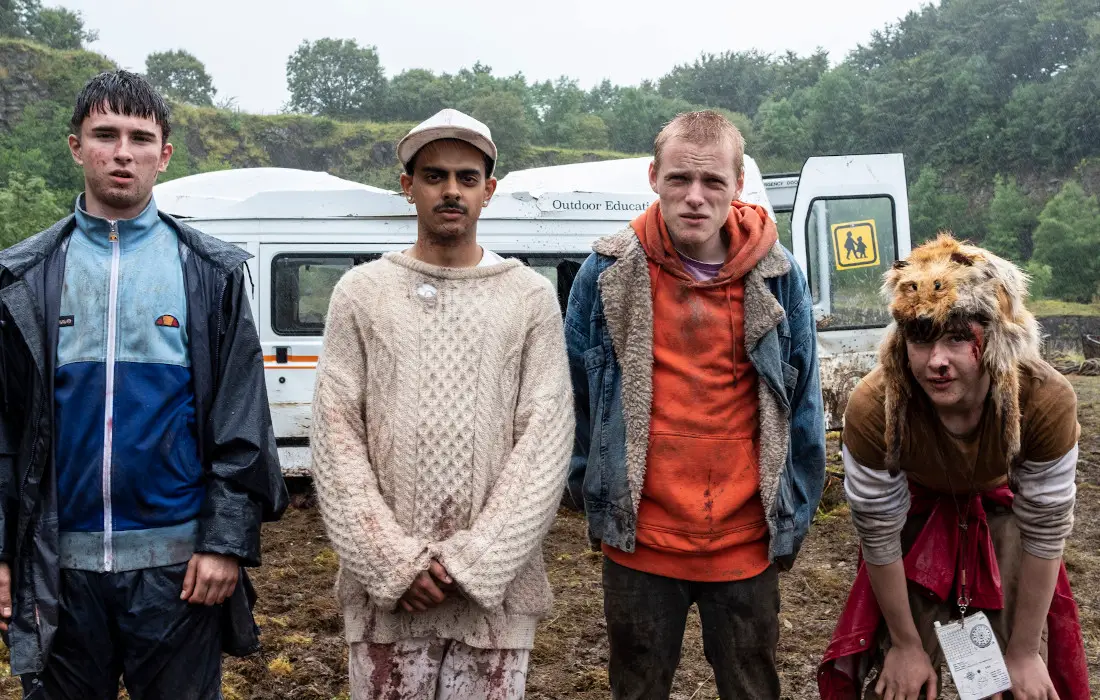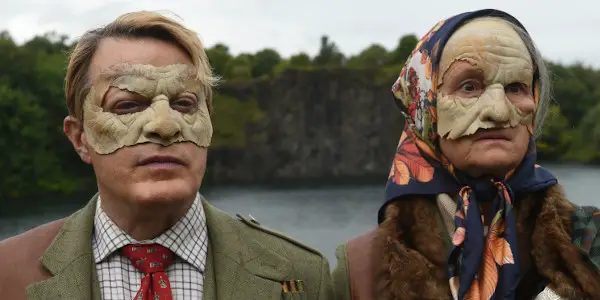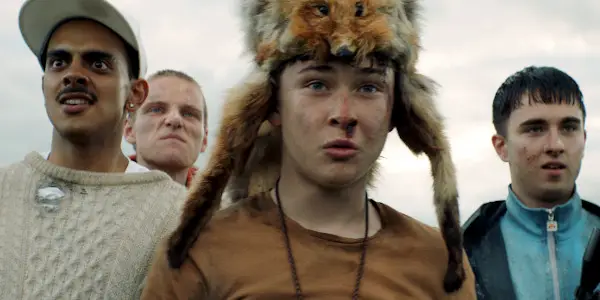Interview with the Cast and Director of GET DUKED!

Luke Parker is an award-winning film critic and columnist based…
The Scottish Highlands, once known for their elegant landscapes and luscious, evergreen fields, are now being trampled by phallic-laced hip-hop, gun-toting generational terrorists, and four teenagers on the brink of a violently valuable adventure.
At least, that’s what’s happening in Get Duked!, Amazon Studios’ rowdy Scottish coming-of-age film. Centered around the real UK youth program, The Duke of Edinburgh Award, the story follows a trio of delinquents (Rian Gordon, Lewis Gribben, Viraj Juneja) and a homeschooled student (Samuel Bottomley) as they’re left to navigate the Highlands with nothing more than a map and what little ingenuity rests between them. The campaign is designed to reward values like teamwork, orienteering, and foraging, but when the trip is hijacked by a gang of violent elders, those rules are flung far beyond the window.
Film Inquiry recently had the opportunity to speak with Lewis Gribben, Viraj Juneja, Samuel Bottomley, and writer/director Ninian Doff about their experiences working on the film. The following are edited excerpts of our conversations.
Luke Parker for Film Inquiry: So this movie is bonkers, I’m just going to lay that out there. But inside all the whacky nonsense is a strong core of ideas and a whole lot of heart. When you guys were first looking at the script, which elements of the film were you most excited to convey?
Lewis Gribben: I just really liked the idea of a knife fight, but with a fork. That was just a small thing, but I remember reading that, and thinking, “yeah, I want to do this.”
Samuel Bottomley: I’d say definitely the comedy side of it, all the bits that made me laugh. That’s what I was excited to get at. When you’re reading a script and it makes you laugh, you’ve got to make it work in person as well so it makes other people laugh. That’s really what I was interested in because I haven’t done a lot of comedy before this – not too much, anyway.

Viraj Juneja: I think reading in the script that there was a hip-hop barn scene with farmers–I mean, I thought, “this is a dream. This is all a dream. All that singing in the shower has finally come to good use.” So I was really looking forward to that, and considering how bizarre the script was, I just thought about how much I could bring to that if I was cast.
Was the level of imagination in this movie surreal to read?
Lewis Gribben: It felt like a weird dream that you have and you wake up and go, “what the f*ck was that?” To read a weird dream on a script was kind of nice. It felt real.
Viraj Juneja: It felt like we were doing a different genre every time we were stepping on set. There’s a comedy side, an action side, a horror side, all these elements. How do you put it under one label? I don’t know.
This script has laid out a very specific, honed-in dialect for all three of you. Were there any challenges fleshing out your characters and the hometown friendship between them while working through the dialect?
Samuel Bottomley: I wouldn’t say so on the connection side of it. I think it was pretty easy for us to get that pretty quick. And that’s gonna happen when you spend every second together, even by the second week.
Viraj Juneja: We had that by the second day, let alone the second week.
Ninian, having grown up in Edinburgh, what elements or anecdotes from the Duke of Edinburgh Award made it your top candidate for a setting?
Ninian Doff: Well, I did [the Duke of Edinburgh Award], which is multi-day camping, hiking, orienteering thing that kids from the United Kingdom have been doing for decades. And it’s a perfect construct for a teen movie that will get you out of a high school: it puts different people together, it forces, even in real life, it forces you into a certain level of peril because when I went on it, I couldn’t read a map. We got lost every five seconds. We were more lost than we were found. And after that, at night, you have to camp, cook, the lot.
Purely as a storytelling device, it was kind of a gift to realize that [the award] was a way of doing an anarchic teenage film with a really solid quest. It was also nice for storytelling because it was like, “we have to get from here to here and let’s figure out how we can do that.
Since we’re talking setting, I have to mention the highlands. This movie incorporates a lot of whacky and vibrant effects, and I was wondering if the aesthetic of the highlands played a role in how you dealt out those SFX?
Ninian Doff: I was really keen on shooting in the highlands because I wanted to be back in Scotland, which is where I’m from, and I can’t remember the exact quote, but someone told me something like, “God’s the greatest production designer.” You know, if you want to make your budget go farther, just drag everyone to an insane landscape and the landscape will do the rest for you.

So it’s stunning and amazing, but then, what I kind of wanted to do was be irreverent. I wanted to drag everyone to the most beautiful landscapes, and then I wanted to not put a bagpipe on it. I wanted to smash American hip-hop right over the top of it, and have people tripping off their phases and morphing. That felt really refreshing to me, and sort of strangely honest because a lot of people living in the highlands aren’t listening to Celtic bagpipes and aren’t entirely sober either. So it felt like a different portrayal of the highlands than you’d usually get, but maybe an honest one as well.
Watching this movie, I’m sure audiences will be shocked that it’s your feature debut, but I don’t think they’d be too surprised to learn that you were a music video director. Why was it important for you to embrace your music-based skillset and make your feature film this free-flowing hybrid of styles?
Ninian Doff: I almost view music videos like other people view short films: I told stories in them, I played with different genres, and I used it as a wave, sort of a film school in its own right. And then coming into this film, I wanted to continue that energy and that voice that I found and the response I was getting to them. I didn’t want to dismiss [that past] and say, “now I’m a serious filmmaker” and ignore all of that. Instead, this film was an extension, and it was almost a love letter to a medium – music videos – that I care so deeply for.
Music videos got me here to this place where I’m making a feature, so there’s a huge aesthetic of my own previous work put into this. And at the heart of the movie, when I was writing it, I had four or five different narrative threads flying along and I knew they had to come together somehow. So instead of making a traditional montage, it suddenly dawned on me that they could come together in a music video. I was going to put a music video in the heart of my own feature film.
It was giddy to write because it was so daft to do that, and then as I started writing it, the music video was the funnest way of concluding all these points. And putting it at the heart of my film, I was sort of giving a shout-out to all my previous work.
It’s important to note that this isn’t just your debut behind the camera, but also your first feature-length script. Despite that fact, your teenage characters are not only fleshed-out but incredibly individual, which is a very nice change-of-pace to the dim teen archetype. Where did you base the foundation of these characters?
Ninian Doff: The hard thing, or the scary thing about writing it was that I was very purposefully playing in genre and tropes to kind of hold my film together. I was unashamedly playing in certain areas of horror, teenage, and coming-of-age. I joked that the film was changing genre every 20 minutes so maybe at the beginning, it’s a mix of Superbad and Stand by Me, and then suddenly it goes into a horror film, and then suddenly it goes into a hip-hop video.

To your point, the thing is when you’re playing with tropes, you are also leaning onto known things about the “outsider kid” and the “not so bright kid” and this and that, but then trying to find original voices within them. One of the things that I really liked was understanding that any film about teenagers is going to be a film about identity, and also understanding the idea that these movie tropes are almost what society has put onto these kids. So it was fun to almost say, let’s make the convention be the jail that they’re in, and then they’ll all have to figure out who they are by breaking the status quo.
I’m happy that you said you felt like that because the scary thing about playing inside certain tropes is that you’re doing it on purpose to try and be original. But there’s a lot of danger in that.
Another thing worth appreciating about the script is that under this blanket of teenage ruckus and literal poop psychedelics are a lot of messages and politics at play. Were there any challenges blending the heart, the mind, and the humor of this movie into the screenplay?
Ninian Doff: That’s a great question, and it was always there from the beginning. I called it the “Trojan Horse:” I wanted to hide political activism in dick jokes, basically [laughs]. So you’re laughing and it’s silly and it’s crass and it’s hallucinogenic, but then suddenly at the end of it, you’re politically fired-up and you’re not going to just accept things the way they are.
That idea was on the blank page. That wasn’t something I found slowly, it was the drive of the script. I [never understood] why a film that wants to speak about important political discussions or injustices have to be “hard work?” Why does it have to be really sad the whole time? I was like, “can’t we just have a lot of fun and talk about something?”
So I was actually at your guys’ SXSW premiere. I’m sure you guys remember, but the laughter was booming off the walls. What was it like being in that audience?
Samuel Bottomley: It was such a good atmosphere, wasn’t it?
Viraj Juneja: So that wasn’t just my first time at SXSW, that was my first time in America. It was like a film in itself. There was some concern, wondering if American people would understand the accent or if they’d like the comedy. And then, as soon as the film started, you hear laughs where we didn’t even think there was a joke. At that point, it felt like we could relax a bit.
Lewis Gribben: I just remember before the film started, there was this big “WHOO!” And I turned around, and it was Elijah Wood, and I was like “what the f*ck?!” It was so weird. He was one of the first people to watch it, and he loved it.
Samuel Bottomley: It was such a great atmosphere. As an actor, it doesn’t get much better than that. It was like a dream come true.
Viraj Juneja: Everyone was there to celebrate our work, not to really form opinions about it. It was a whole journey that was beautiful.
Film Inquiry thanks Ninian Doff, Samuel Bottomley, Viraj Juneja, and Lewis Gribben for their time.
Get Duked! will be available to stream on Amazon Prime starting August 28th.
Watch Get Duked!
Does content like this matter to you?
Become a Member and support film journalism. Unlock access to all of Film Inquiry`s great articles. Join a community of like-minded readers who are passionate about cinema - get access to our private members Network, give back to independent filmmakers, and more.
Luke Parker is an award-winning film critic and columnist based in the Baltimore-Washington metropolitan area. As an entertainment journalist, he has interviewed several members of the film industry and participated in some of its most prestigious events as a member of the press. Currently, he is working to obtain his bachelor’s degree in Mass Communication at Towson University.













